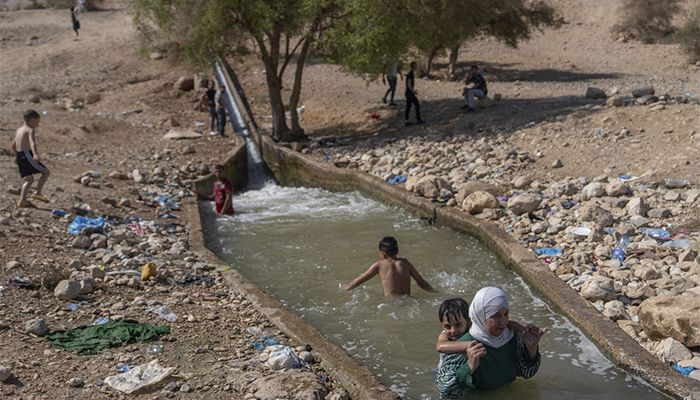
International Desk
Publish: 18 Aug 2023, 01:38 pm

Photo: Collected
A recent World Resources Institute (WRI) research found that people in 25 countries, or about 25% of the world's population, use 80% of the water that is available to them yearly and are under severe water stress.
When there is a shortage of water in a certain area, there is a condition known as water stress. When there is not enough fresh water available to fulfill the demands of society, industry, agriculture, and the environment, it happens.
According to the institute's Aqueduct water risk map, water consumption has grown significantly since 1960, more than doubling globally.
These five nations—Bahrain, Cyprus, Kuwait, Lebanon, and Oman—have the worst water problems. On the list, Bangladesh continues to be on position 56.
While water consumption has stabilized in Europe and the US, it is skyrocketing in Africa. By 2050, the predicted rise in the world's water consumption is between 20% and 25%.
"Living under this kind of water stress puts people's lives, work, food security, and access to electricity at danger. The production of power, sustaining human health, creating egalitarian communities, and achieving global climate objectives all depend on water, according to the report's authors. Water is also essential for growing crops and rearing cattle.
"Without better water management, population growth, economic development and climate change are poised to worsen water stress," they added.
Aqueduct estimates that by 2050, 31% of the world's GDP or $70 trillion, will be under high water stress, up from 24% ($15 trillion) in 2010.
More than half of the exposed GDP in 2050 will be accounted for by four nations: India, Mexico, Egypt and Turkey.
Between 2017 and 2021, India's thermal power plants lost 8.2 terawatt-hours of energy due to a lack of water to cool them, which is equivalent to the five-year electricity needs of 1.5 million Indian households.
According to research on water risks, countries' ability to grow economically is at risk. Food production is also impacted. 60% of all irrigated agriculture worldwide, particularly sugarcane, wheat, rice and maize, is under extremely high water stress.
Meanwhile, to feed a projected 10 billion people by 2050, the world will need to produce 56% more food calories than it did in 2010.
According to the report, interventions can prevent water stress from causing crises.
According to the paper, Singapore and Las Vegas have thrived despite having limited access to water. The local government has been able to preserve water by using desalination as well as other techniques including wastewater treatment and reuse.
The report's authors contend that in order to achieve water efficiency and alleviate water stress, political will is necessary.
Bahrain, Cyprus, Kuwait, Lebanon, Oman, Qatar, United Arab Emirates, Saudi Arabia, Israel, Egypt, Libya, Yemen, Botswana, Iran, Jordan, Chile, San Marino, Belgium, Greece, Tunisia, Namibia, South Africa, Iraq, India, and Syria are the top 25 nations with the highest water stress.
Subscribe Shampratik Deshkal Youtube Channel
© 2024 Shampratik Deshkal All Rights Reserved. Design & Developed By Root Soft Bangladesh